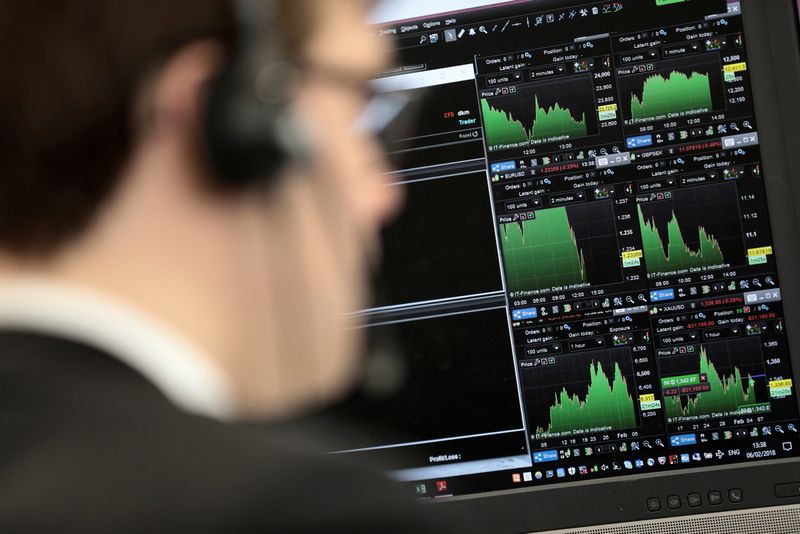Investing.com -- Microsoft regains its title as the world's most valuable company after Nvidia's stock retreated. Wall Street is set for a calm open, while Boeing is close to regaining control of Spirit AeroSystems.
1. Microsoft takes back the lead, for now
Microsoft (NASDAQ:MSFT) has regained its title of the world’s most valuable company, after Nvidia’s shares declined over 3% on Thursday.
Nvidia (NASDAQ:NVDA), whose market capitalization surpassed that of Microsoft on Tuesday, lost over $100 billion to register a closing market value of $3.21 trillion.
Microsoft's market value also slipped, to $3.31 trillion, as its shares fell marginally during Thursday’s session.
Nvidia, Microsoft and Apple (NASDAQ:AAPL) are in a three-horse race to become the world's most valuable company - with the iPhone maker's market capitalization at $3.22 trillion.
However, this may prove to be a blip in Nvidia’s seemingly relentless rise, with its stock having nearly tripled so far this year.
Nvidia stands at the forefront of a massive technological shift as the dominant provider of chips to support artificial intelligence applications. Revenues are expected to double this fiscal year to $120 billion and rise to $160 billion in the following year.
Software giant Microsoft, by comparison, is expected to grow revenues by about 16% for its fiscal year.
“Nvidia's GPU chips are in essence the new gold or oil in the tech sector as more enterprises and consumers quickly head down this path with the 4th Industrial Revolution well underway,” Wedbush analysts said in a note.
The investment firm notes that Nvidia's dominance in data center AI spending positions it as a pivotal player in the AI revolution, with all generative AI applications relying on its GPUs.
Wedbush predicts that over the next three years, more than 70% of enterprises will adopt AI use cases, leading to an estimated $1 trillion in incremental AI spending over the next decade.
2. Futures flat ahead of key activity data
U.S. stock futures traded largely unchanged Friday, but are on course for a winning week ahead of the release of widely-watched activity data.
By 04:00 ET (08:00 GMT), the Dow futures contract was 60 points, or 0.2%, lower, S&P 500 futures dropped 4 points, or 0.1%, while Nasdaq 100 futures rose by 10 points, or 0.1%.
Losses in market darling Nvidia weighed on both the S&P 500 and the Nasdaq Composite on Thursday, with the former dropping 0.3% and the latter 0.8%. The Dow Jones Industrial Average was the outperformer, gaining 0.8% - its best day this month.
That said, all three major averages are on pace for weekly gains. The S&P 500 is on track for a gain of 0.8%, the Nasdaq is up 0.2%, while the DJIA is set for a 1.4% rise.
Quarterly earnings are due from used vehicle retailer CarMax (NYSE:KMX), while investors will also be looking toward manufacturing and services Purchasing Managers’ Index readings for June, for clues of the health of the U.S. economy.
Existing home sales data for May is also slated for release.
3. Boeing nears deal to buy back Spirit AeroSystems
Boeing (NYSE:BA) is on the verge of agreeing to repurchase Spirit Aerosystems (NYSE:SPR), its former subsidiary, according to a report from Reuters.
The airplane manufacturer began negotiations to repurchase the supplier that it had spun off in 2005 earlier in this year, but ran into difficulties due to Spirit's work for Boeing’s main rival Airbus.
The European group had threatened to obstruct any deal that involved Boeing manufacturing parts for its latest models.
However, there appears to have been progress made on this thorny issue, as Boeing and Airbus have broadly succeeded in dividing Spirit's programs into work that Boeing will take back, along with work that the European rival will take.
Boeing’s move to reclaim Spirit is aimed at stabilizing a critical part of the supply chain for its best-selling jet after a mid-air blow out on a new 737 MAX in January.
4. British public debt soars
The U.K. general election draws near, and a change of government looks more and more likely as Keir Starmer's Labour Party is far ahead of Prime Minister Rishi Sunak's Conservatives in the polls.
However, the latest data shows the difficulties either party will have stabilizing the country’s finances as British public debt rose last month to its highest as a share of the economy since 1961.
Public sector net debt rose to 99.8% of gross domestic product in May, up from 96.1% a year earlier, the Office for National Statistics said Friday.
Public debt soared in Britain during the COVID-19 pandemic, and the public finances have also been hit by slow growth and a rise in Bank of England interest rates to a 16-year high.
Both political parties have said they intend to stick with existing budget rules, and have pledged not to raise the rate of income tax, value-added tax or other major levies.
5. Crude set for weekly gains
Crude prices traded marginally lower Friday, but were set to rise for a second week, helped by signs of improving demand in the U.S., the world's biggest oil consumer.
By 04:00 ET, the U.S. crude futures (WTI) traded 0.3% lower at $81.09 a barrel, while the Brent contract dropped 0.3% to $85.50 per barrel.
Both benchmarks are on course to register gains of over 3% this week, trading close to the highest levels in over seven weeks.
Data released on Thursday by the Energy Information Administration showed a drawdown in U.S. crude stockpiles by 2.5 million barrels in the week ending June 14, more than the 2.2 million-barrel draw expected.
Additionally, U.S. government data showed total product supplied, a proxy for the country's demand, rose by 1.9 million barrels per day (bpd) on the week to 21.1 million bpd.
